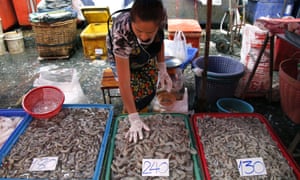It's a Cruel World of Indentured Labour
"Our investigations at sea and across the Thai seafood sector continue to find extensive violence, corruption and abuse."When we do our supermarket shopping for food products and look at the seafood, deciding whether to buy shrimp this week or something else for the dinner table do any of us give a thought as to where and how those shrimp are caught and transported? Human traffic smugglers persuade vulnerable young people from poor backgrounds in southeast Asia to go to Thailand to earn a living in the fishing market where they will have a good salary, sufficient to send back home to their families. And sometimes families take the initiative and sell their teenage children to the human traffickers out of financial desperation.
"Slaves are still on the boats; nationals of neighbouring states are still trafficked in to provide cheap or free labour, and Thai fishing vessels continue to fish illegally and unsustainably, thereby reinforcing the economic incentives to use bonded, forced and slave labour to keep the costs down."
Steve Trent, director, Environmental Justice Foundation (EJF)
 |
| A fish-seller sorts shrimp at Klong Toey market in Bangkok. Activists claim that government measures have failed to end labour abuses in Thailand’s seafood industry. Photograph: Barbara Walton/EPA |
"In our work in southeast Nepal, we find that unsafe migration and bonded labour are very closely connected."In Qatar construction in preparation for the 2022 FIFA World Cup has employed tens of thousands of people from India, Nepal, the Philippines and elsewhere, and hundreds of those workers have died as a result of unsafe working conditions and no regard for the safety of people working as indentured labourers. And nor is Qatar alone in this violation of human rights in exploiting the labour of workers from southeast Asia. Migrant workers are in high demand in Bahrain, Kuwait, Oman, Saudi Arabia and the United Arab Emirates.
"The families desperately hope that income from their members, mostly young men, working in the Middle East will allow them to pay off debts to the landlord for whom they work, and even perhaps allow them to purchase some land to be able to gain some independence. But when it goes wrong and the family member is in conditions of slavery in the destination area, then the family at home is often deeper in debt bondage because they have borrowed in order to send the worker abroad."
Ginny Baumann, Senior Programs Officer at the Freedom Fund
Their oil wealth has stimulated massive investment in huge new infrastructure building, and eye-popping architecturally bold ventures to loud acclaim, but with no indigenous workforce to labour at the construction projects, the intake of foreign workers anxious for employment is huge. Gulf state citizens have traditionally, because of their countries' oil wealth, received free social benefits, with no incentive left to them to provide the muscle and talent to engage in construction work. The benefits that accrue to the indigenous citizens do not migrate to foreign labourers.
The Democratic Republic of Congo, beset by years of conflict in tribal, ethnic and clan violence, is a country rich with natural resources. Slavery is a condition that rears its ugly head there with open pits in the Walikale area tunnelling into a mountain from which men and women extract coltan, a mineral used in electronic products, like cellphones. The workers have no rights, are kept in deplorable conditions and fed a miserable diet with no medical care. They are pressed to work, hale or ill. Armed guards stand watch over them.
The women are raped by the guards routinely, under this unspeakable system of slave labour. We are unknowingly complicit when we buy products that contain elements procured in trade with these countries. Such a mine has no legal recognition, the mineral extracted goes onto the corporate market through middlemen, at a cheap price enabled by slavery. The supply chain is almost unknowable and untraceable by Western governments attempting to establish origins. We aid slavery by default, through no discernible fault of our own.
Women employed as domestics in the Gulf states must surrender their passports, leaving them unable to flee an abusive employer for fear of being without papers so the authorities will deport them and they will be left without employment unable to send support money back to their countries of origin. Foreign workers labouring under these conditions have no rights under the laws of the countries that import them to produce labour that no Gulf citizen would demean themselves with.
"Women [in Qatar] who have been physically or sexually abused face major obstacles to getting justice. None of the women researchers spoke to had seen their attackers prosecuted or convicted. In one horrific case, a domestic worker broke both her legs and fractured her spine when she fell from a window as she tried to escape a rape attack by her employer. Her attacker then proceeded to sexually assault her as she lay on the ground, injured and unable to move. Only afterwards did he call an ambulance.
When researchers interviewed her six months after the attack, she was still using a wheelchair. Despite her appalling injuries, the Public Prosecutor dismissed the case due to “lack of evidence” and she returned to the Philippines last year. Her employer has never been held accountable." Amnesty International
Labels: Africa, Middle East, Slavery

0 Comments:
Post a Comment
<< Home